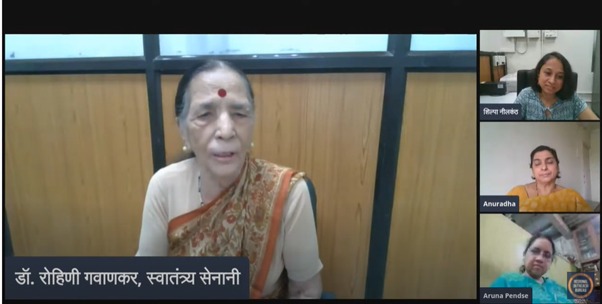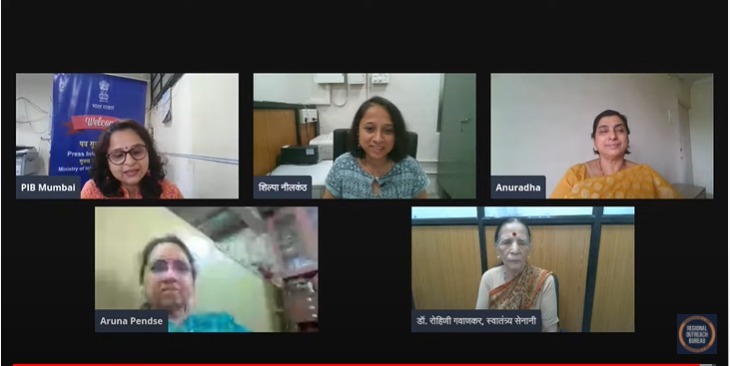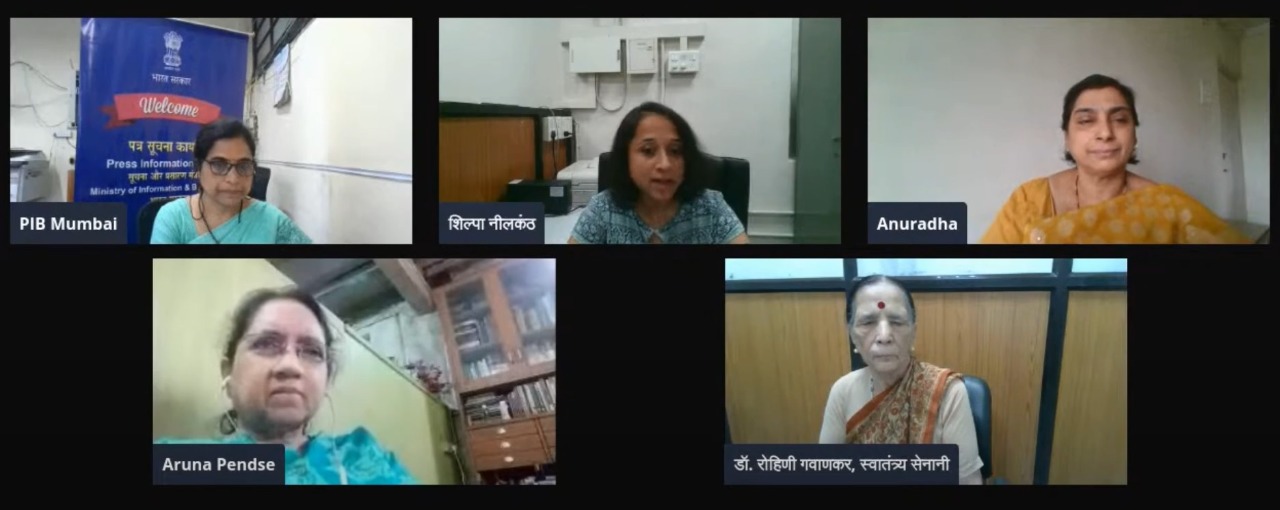Ministry of Information & Broadcasting
Nonagenarian Freedom Fighter Rohini Gavankar addresses PIB Mumbai Webinar on Role of Mumbai in Freedom Movement
When the freedom movement became leaderless, girl students and women of Mumbai kept it alive: Rohini Gavankar
Posted On:
27 AUG 2021 4:34PM by PIB Mumbai
Mumbai, 27 August 2021
“Mumbai saw participation of many brave women in India’s freedom struggle. For their participation, they were even penalised with rigorous imprisonment. Madam Cama, a Parsi from Mumbai, inspired the nation to have a flag of its own by hoisting the first flag for India. Perin Captain and her two sisters, who were grand-daughters of Dadabhai Naoroji, sold Khadi door to door in Mumbai as an effort to popularise Khadi and thus weaken British rule.” These are the recollections of nonagenarian freedom fighter Rohini Gavankar, during her address at a PIB Mumbai webinar held today, on role of Mumbai in the nation’s freedom struggle.

Shedding further light on women’s contribution in the freedom struggle, Smt. Gavankar said that when the movement became leaderless in the last phase, after the arrest of all prominent leaders, it was girl students and women of Mumbai who kept it alive. “Mumbai’s girl students and women undertook various activities on their own initiative. Even before Indira Gandhi’s Vanar Sena, Ushaben Mehta had started Manjar Sena (Cat Army) in Mumbai. This army was entrusted with mocking and teasing the police and the armed forces”. The 92-year-old veteran freedom fighter added that Pandit Jawaharlal Nehru deeply appreciated the role played by Mumbai’s women in the freedom struggle during 1930-1940 and called their efforts an inspiration for the whole nation.
Smt. Gavankar shared memories of her personal experience of partaking in the freedom struggle. “One of my brothers faced imprisonment and death sentence. Another brother took part in the Prati Sarkar movement. I was around 14 years old then. I used to mobilise children and would also sing patriotic songs loudly during that time. I did the role of messenger in the Prati Sarkar movement.”
The webinar was organized by Press Information Bureau and Regional Outreach Bureau, as part of Ministry of Information and Broadcasting’s celebration of Iconic Week of Azadi Ka Amrit Mahotsav.

Speaking on this occasion, columnist Ms. Anuradha Ranade added that more than 300 rebellions occurred against the tyrant rule of British East India Company during 1757 to 1857. Narrating Mumbai’s role, Ms. Ranade spoke about the contribution of Bombay Presidency Association and Indian National Congress. “Due to the divisive and unjust policies of the British, many parts of India saw the emergence of various organisations. One of them was Bombay Presidency Association, founded in 1885. Indian National Congress was originally Indian National Union; however in the Bombay Session of 1885, it was renamed as Indian National Congress. This session took place in Congress Bhawan near Elphinstone Road. It had 72 participants, of which 18 were from Mumbai. Mumbai was the epicentre of India's freedom struggle and South Mumbai was used as a location to hold demonstrations against British policies.”
Noted academician, Ms. Aruna Pendse explained how natives of Mumbai participated in the Salt Satyagraha. “Mumbaikars of that time used the locations of Mahalakshmi and Chowpatty to perform Salt Satyagraha. Events in 1942 showed the multi-coloured and multi-ethnic nature of Mumbai. Under Mahatma Gandhi’s influence, the Gujarati trading community took a wholesome part in the freedom struggle. The Marathi community also participated in huge number. Political rallies on a mass scale first started in August Kranti Maidan or Gowalia Tank Maidan. It was here on 8th August 1942 that Gandhiji asked the British to Quit India. Thereafter, Shivaji Park and other places also emerged as locations for rallies.”
Ms. Pendse went on to add that Aruna Asaf Ali and Usha Mehta encouraged women to participate in freedom struggle. Mumbai remained the epicentre but the movement started spreading to other parts of the country, she added.

Ms. Jaydevi Pujari Swami, Assistant Director, PIB gave introductory remarks and Ms. Shilpa Nilkanth, Exhibition Assistant, ROB moderated the webinar. Vote of Thanks was given by Ms Sonal Tupe, Information Assistant, PIB.
The webinar can be watched at this link: https://youtu.be/pVnITlGLAF4
* * *
PIB Mumbai | DJM/Mahesh/DR
Follow us on social media:  @PIBMumbai
@PIBMumbai  /PIBMumbai
/PIBMumbai  /pibmumbai
/pibmumbai  pibmumbai[at]gmail[dot]com
pibmumbai[at]gmail[dot]com
(Release ID: 1749566)
Visitor Counter : 1350